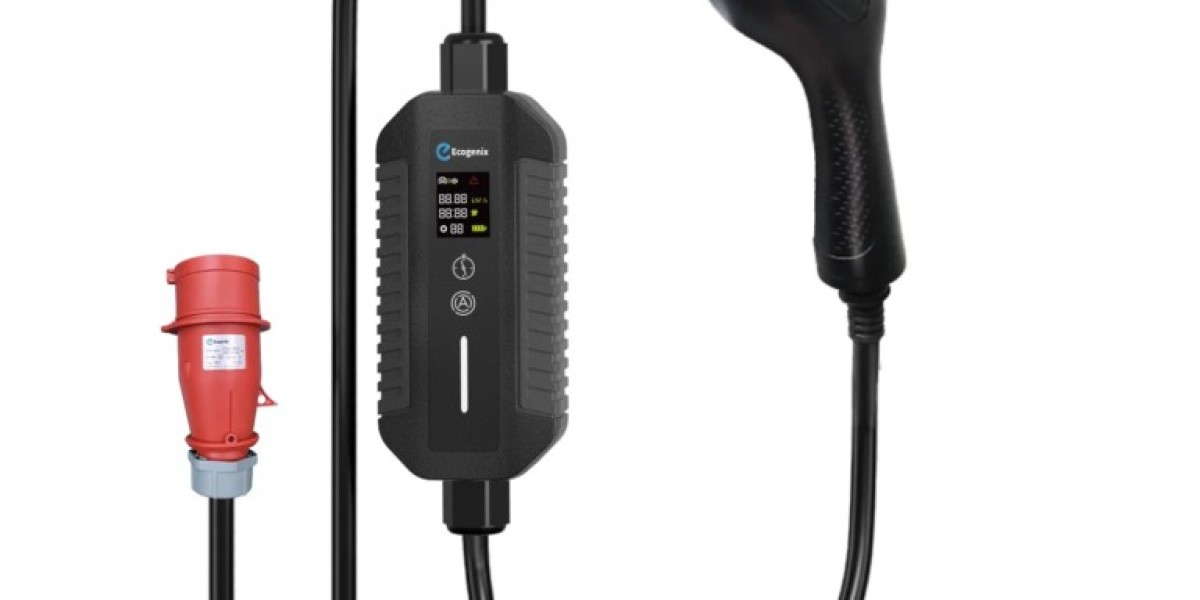As electric vehicles (EVs) continue to gain popularity, the demand for versatile and convenient charging solutions has grown. One such solution is the portable EV charging station. These compact, adaptable devices offer flexibility for EV owners who need to charge their vehicles in various locations. This article explores what a portable EV charging station is, how it works, and why it might be a valuable addition to your electric vehicle setup.

What is a Portable EV Charging Station?
Definition and Overview
A portable EV charging station is a compact and movable device designed to charge electric vehicles from various power sources. Unlike fixed charging stations that are installed at a specific location, portable chargers offer the flexibility to be used at home, work, or on the go. They typically come with a standard plug that can be connected to any compatible power outlet, making them an adaptable solution for EV owners.
Types of Portable EV Chargers
Portable EV chargers can be categorized based on their power level and functionality:
Level 1 Chargers: These chargers use a standard 120-volt household outlet. They are usually the slowest charging option, but they offer the convenience of being plugged into any standard wall socket.
Level 2 Chargers: These chargers use a 240-volt outlet, similar to the one used for large appliances like dryers. Level 2 chargers offer faster charging times compared to Level 1 chargers and are often preferred for home use or at locations with dedicated charging infrastructure.
DC Fast Chargers: While less common in portable formats due to their size and power requirements, some advanced portable chargers offer DC fast charging capabilities, which provide rapid charging for electric vehicles.
How Does a Portable EV Charging Station Work?
Basic Components and Functionality
A portable EV charging station typically consists of several key components:
Charging Cable: The cable connects the charger to the electric vehicle. It usually has connectors compatible with the EV’s charging port.
Power Supply: This component converts the electrical power from the outlet into a format suitable for charging the vehicle’s battery. It may include a built-in inverter or transformer, depending on the charger’s type.
Control Unit: The control unit manages the charging process, including communication between the charger and the vehicle, safety protocols, and charging rate adjustments.
Connector: The connector interfaces with the EV’s charging port. It must be compatible with the vehicle’s connector type, such as Type 1 (J1772), Type 2 (Mennekes), or CCS (Combined Charging System).
Charging Process
The charging process with a portable EV charger involves several steps:
Connection: The portable charger is connected to a power source, such as a standard wall outlet or a 240-volt outlet, and then to the EV’s charging port.
Communication: Once connected, the charger communicates with the vehicle to determine its charging requirements and capabilities. This communication ensures that the charging process is safe and efficient.
Power Conversion: The power supply in the charger converts the electrical current to the appropriate voltage and current needed for the EV’s battery.
Charging: The charging process begins, and the EV’s battery is replenished with energy. The control unit monitors the charging status and adjusts the power flow as needed.
Completion: Once the battery reaches the desired charge level, the charging process is completed. The charger may notify the user through an indicator light or app if applicable.
Advantages of Portable EV Charging Stations
Flexibility and Convenience
Portable EV chargers offer several advantages, including:
Versatility: They can be used in various locations, making them ideal for travel, emergency situations, or areas with limited charging infrastructure.
Home Charging: They allow EV owners to charge their vehicles at home using existing power outlets, eliminating the need for dedicated charging installations.
Emergency Charging
In cases where a fixed charging station is unavailable or malfunctioning, a portable charger can provide a critical backup solution. It ensures that you are not stranded with an uncharged battery.
Cost-Effectiveness
Portable chargers are often more affordable than installing a dedicated Level 2 charging station. They provide a cost-effective solution for those who do not require rapid charging speeds or who use their EVs primarily for short trips.
Considerations When Using a Portable EV Charging Station
Power Source Compatibility
When choosing a portable EV charger, consider the type of power sources available to you. Ensure that the charger is compatible with standard household outlets or the specific outlets you plan to use.
Charging Speed
Understand that the charging speed of a portable EV charger can vary based on its type and the power source. Level 1 chargers are slower and may not be suitable for fast charging needs, while Level 2 chargers offer faster charging times.
Safety and Certification
Ensure that the portable charger you select is certified and meets safety standards. Look for certifications such as UL (Underwriters Laboratories) or CE (Conformité Européenne) to ensure the charger’s safety and reliability.
Cable Length and Portability
Consider the length of the charging cable and the overall portability of the charger. A longer cable can offer greater flexibility in where you can park your vehicle relative to the power source.
Choosing the Right Portable EV Charger
Assess Your Needs
Determine your primary use case for the portable charger. If you need a charger for occasional use or emergency situations, a Level 1 charger may suffice. For more frequent or faster charging, consider a Level 2 or even a DC fast charger.
Evaluate Features
Look for features that enhance the usability of the portable charger, such as:
Smart Features: Some portable chargers offer smart capabilities like app integration, remote monitoring, and scheduling.
Durability: Choose a charger with rugged construction if you plan to use it in various environments or transport it frequently.
Compare Options
Research and compare different portable EV chargers based on their specifications, features, and user reviews. This will help you find a charger that meets your needs and offers good value for money.
Conclusion
A portable EV charging station offers a flexible and convenient solution for electric vehicle owners, providing the ability to charge their vehicles from various locations. By understanding how these chargers work and considering factors such as power source compatibility, charging speed, and safety, you can choose the right portable charger to enhance your EV ownership experience. Whether used for everyday home charging or as a backup solution during travel, a portable EV charger can be a valuable addition to your electric vehicle setup, ensuring that you remain charged and ready to go wherever you need to be.







